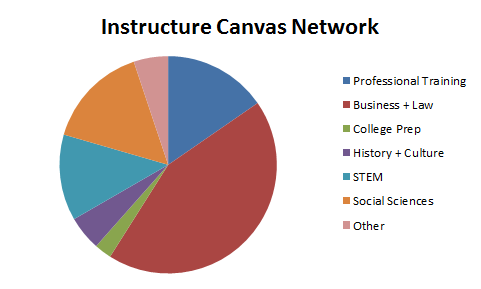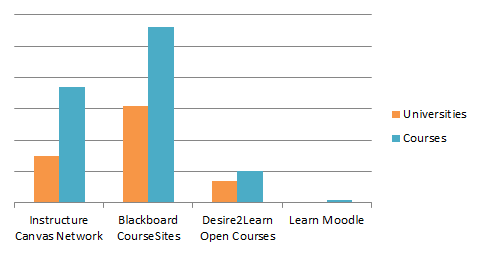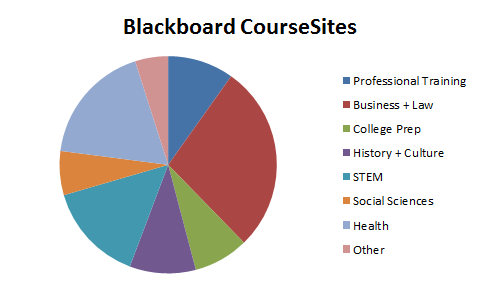The other evening, a close friend of ours was discussing a bad experience taking a MOOC on Coursera. Neither the content nor the format of the class was the problem; rather, it was the experience of Coursera’s online platform that left this person wishing that it was delivered via a traditional LMS instead.
Since late 2012, there has been conversation about the overlap between the LMS and MOOC platform markets. While most of the edtech community continues to focus on the major MOOC platforms (e.g.: Coursera and EdX), each of the major LMS makers now has a solution for teaching MOOCs as well. Blackboard’s CourseSites has offered “open enrollment” courses since April 2012, the very month Coursera was founded, although the organization’s official press didn’t mention the acronym “MOOC” until early/mid 2013. Instructure launched their own Canvas Network in November of 2012. Desire2Learn held their first Open Course in August 2013, although their solution wasn’t officially announced until October. Moodle held a MOOC on their LMS MOOC platform called Learn Moodle in September 2013. Sakai remains the outlier, coordinating no centralized MOOC effort or course catalog, though in November 2013 Sakai began being used as one university’s own MOOC delivery platform.
What is interesting about each of these efforts is that to some degree, anyone can now teach a MOOC – even individuals with no university affiliation. LMS makers have reported MOOC enrollments into the thousands and in some cases tens of thousands of students. And while some LMS makers limit access to their MOOC platforms to instructors from their own current client bases, they have not appeared to exhibit the same “contractual elitism” as Coursera has in only allowing certain institutions to teach MOOCs. And unlike EdX, MOOC teachers using these platforms (as of current) do not have to pay to play.
LMS-based MOOC platforms offer a unique opportunity for instructors. Rather than having to rebuild course content within the walls of Coursera or EdX or entering into new, complex legal agreements, these platforms jump start the course delivery experience and can even use the native export/import tools of institutional LMSs to bring existing course content into a familiar LMS product. Similarly, taking a MOOC on an LMS MOOC platform can give instructors another unique experience – that of using a traditional LMS as a student.
To compare the MOOC efforts of the major LMS makers, we took a look at the public course catalogs of each of the above-mentioned sites. Blackboard’s CourseSites appears to have the broadest adoption in terms of universities and advertised courses. Moodle, surprisingly, has the least.
| Blackboard CourseSites | Desire2Learn Open Courses | Instructure Canvas Net | Learn Moodle | |
| Universities | 31 | 7 | 15 | 0 |
| Courses | 56 | 10 | 37 | 1 |
At first glance, these numbers might lead one to conclude that some universities are teaching multiple MOOCs on each LMS platform. This is only partially true. There are a growing number of individuals with no indicated university affiliation, and other organizations and non-profits (ie: not schools) that are using these platforms to teach open courses.
This mix of university and non-university instructors has led to an interesting mix of courses being taught on each platform. We attempted to categorize these below.
Blackboard’s CourseSites has the widest diversity of course offerings with quite a few focusing on business, law, healthcare, and STEM-related topics. The earliest large open courses hosted on CourseSites appear to be focused on professional development and training for online educators. Because of its software delivery model, Blackboard struggles to keep its client base up-to-date on the latest version of its LMS technology. CourseSites offers a unique opportunity for it to highlight its most recent improvements directly to instructors.

Instructure’s Canvas Network, although with fewer courses, still offers a wide range of variety. Business, professional training, social sciences, and STEM appear to be its top categories. Instructure has done a very good job of generating interest in its platform with interesting MOOC topics such as The Walking Dead (aka Zombie) MOOC, a Winter Olympics MOOC, and other topics catering to different interests. One interesting differentiator is that Canvas Network appears to be the only LMS MOOC platform at this time that supports a registration workflow that includes charging students for participating in a MOOC.
One of the newest entrants is Desire2Learn’s Open Courses platform. Because it is so new, there is a limited but growing selection of courses. STEM and college preparation/remediation courses appear to be the most popular to teach on this platform.
At this time, Moodle only has one MOOC offering, delivered directly by the Moodle organization and not via a university. This course appears to serve as a feeder into the official Moodle Certification program which is administered for a fee by Moodle partners around the world.
While each LMS maker has a vested interest in using MOOCs as a way to highlight its own LMS platform, it is encouraging to see growing interest by universities and others to teach MOOCs using these and other solutions. In fact, when looking at our data of who is using which MOOC platform solutions, we were surprised to see that some universities are actually teaching on multiple MOOC platforms, including those that are based on LMSs and those that are not.
As for the LMS-based ones, there is a healthy and growing mix of learning opportunities being offered through each, and to our knowledge no LMS maker directly charges for use of its MOOC platform at this time. Perhaps as more universities open up courses in this manner, we’ll begin to see MOOC marketplaces and MOOC course catalogues pop up and guide learning choices across all platforms.
While doomsayers seem convinced that MOOCs spell the end of higher education as we know it, we believe that MOOCs reinforce its value, particularly for long-tail, niche, or life-long interests. LMS makers, however, should be more concerned about the successes of the MOOC platforms, as they approach online courses from a very different angle – one that begins to put the experience of the course and its content first rather than the features of the platform through which it is delivered. The traditional LMS makers have always had an edge in terms of the capabilities of tools to support and enhance the online learning experience, but these organizations themselves do not have the edge on content. (They do, however, have a significant network of instructors who use their products and may be willing to teach MOOCs.) This begs the question – where is the value for learners? – in the learning content itself, in the instructor delivering it, in the technical and functional capabilities of the platform through which it is delivered, perhaps a combination of all of these, or maybe even none of them? Tweet or blog a reply using the hashtag #LMSMOOC.


